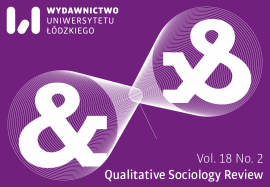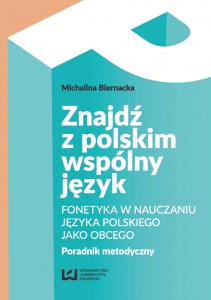Qualitative Sociology Review | Vol. 18 No. 2
Opublikowano: 30 maja 2022

Qualitative Sociology Review jest anglojęzycznym kwartalnikiem Wydawnictwa Uniwersytetu Łódzkiego, który podobnie jak “Przegląd Socjologii Jakościowej” podejmuje refleksję nad jakościową i interpretatywną drogą uprawiania socjologii. Redakcja dąży do współpracy, integracji i rozwoju środowiska naukowego, a swoją inicjatywę podejmuje w imię wartości takich jak: indywidualność, równość, tolerancja, społeczność, nauka, ludzkość.
Motywem przewodnim nowego numeru kwartalnika (PDF) staje się problematyka zmian w relacjach społecznych:
What Is Going On? An Analysis of the Interaction Order
Vidar Halldorsson
Seeing sociology visually adds a sense of realness to the viewer compared to only reading sociological texts. In this paper, I aim to provide an example of how a single scene from a feature film can be utilized as a practical and meaningful means to analyze a social situation and to help students of sociology to grasp key features of Goffman’s theory of interaction order. More precisely, the main aims of the paper are 1) to illustrate Goffman’s theory of the interaction order by identifying acts of disruption and alignment in interaction through a film clip; and 2) to attempt to analyze, in a Goffmanian sense, what is really going on in the situational interaction. The scene is from the 2013 American movie August: Osage County and follows a dinner of immediate family in the wake of the funeral of the hostess’s late husband. The normative and civilized interaction of the meal is, however, jeopardized by the hostile and provocative mood of the hostess, as she repeatedly disrupts the interaction order with attempts to mock and/or uncover the hidden and vulnerable truths of the immediate members of her family, exemplifying her power status in the particular situation. The dinner guests, however, try to overlook and resist the provocation of the hostess and stick to their predetermined roles to save and sustain their idealized selves (their faces) and the interaction order (the faces of others), In doing so they, on the one hand, discard the uncomfortable truths acclaimed by the hostess and, on the other, explain the hostess’s provocative actions in terms of their claim that she is unwell and in need of medical attention. Thus, the attacked dinner guests in the scene align more alliance to the interaction order than to truth itself.
Christine Carey
This article draws on data collected through semi-structured interviews with intercollegiate cross country and track athletes to investigate how female distance runners experience their sport concerning gender and embodiment. The runners identified gender as affecting their sport by way of shorter distances for women’s races, heightened involvement of coaches in corporeal matters such as diet and weight, as well as sex verification policies. Distance running was also specifically identified as a sport that intensifies societal pressures for women to be thin. Drawing on Foucault’s theory of disciplinary power, this paper explores how dominant discourses on gender and the body are reproduced within distance running through a combination of structural and cultural practices. However, the paper also highlights resistance to cultural ideals among female runners, calling for a more dynamic understanding of disciplinary power that accounts for individual agency.
Joshua D. Vadeboncoeur
This article places its attention on how the spatial boundaries, practices, and separations—as structured by whiteness—impact the contestation and negotiation of meaning-making processes in the production and consumption of NASCAR space(s) for Black fans. It was through that vantage point that the participants demonstrated a nuanced understanding of whiteness, particularly through an awareness of NASCAR as a White space, how to effectively navigate such a White space, and a contextualization of more recent enactments of whiteness within these spaces. To explore and define Black individuals’ racialized experiences and movements as NASCAR fans from their perspective, this article uses a qualitative approach as grounded in narrative inquiry. Thus, findings demonstrate how Black fans make meaning of whiteness within the geographies of NASCAR, which advances theoretical understandings of how whiteness is perceived and represented in the Black imagination. Informed by Southern regional identity and the navigation of White space, these representations of whiteness as exclusive, fearful, and possessive are made salient through NASCAR’s attachment to racialized cultural values.
Alfred Schütz Revisited: Social Exclusion of Refugees in Brandenburg
Ingmar Zalewski
For refugees, the transition from their home to the host society is especially challenging. In particular, their situation shortly after arrival entails the risk of social exclusion. Based on two case studies, this article reconstructs experiences of exclusion within the integration processes of Cameroonian refugee men and unaccompanied minors in the region of Brandenburg, Germany. What connects the studies are the existential threats of being forced to wait due to having an unclear future and a pattern of being unable to refer to (positive) lived experiences in the local environment. The article approaches these dynamics by applying Alfred Schütz as a helpful analytical heuristic to the findings. The possibilities and pitfalls of the deployed Schützean framework are highlighted considering current methodological developments in the field.
Biographical Work as a Mechanism of Dealing with Precarity and Precariousness
Jacek Burski, Adam Mrozowicki, Aleksandra Drabina-Różewicz, Agata Krasowska
The article aims to explore the relationship between biographical work and the strategies of managing precarity (low-paid and unstable employment) and precariousness (insecurity and instability of life conditions in general) in Poland’s new capitalism. Poland witnessed the rise of precarity during the entire capitalist transformation after 1989, while the expansion of precarious, temporary, and non-standard employment accelerated in the first two decades of the 21st century. The main theoretical framework of the article is based on concepts deriving from biographical sociology and was elaborated during a joint workshop with German biographical researcher, Fritz Schütze, within the PREWORK project. The case of a young female shop assistant, Helena, with a difficult family and work background was selected from a larger sample of 63 biographical narrative interviews with precarious young workers in Poland. Based on the case study and the broader context of the research project, it is argued that biographical work may have the potential for questioning and challenging precarity; yet, without necessary biographical and social resources, such a process is hard to be completed. As a result, the paper questions the macrosocial vision of “precariat” as the “class in-the-making” and instead offers a detailed account of the microsocial ways of dealing with precarity by a representative of the most disadvantaged group of precarious young workers.
Michael Adorjan, Rosemary Ricciardelli, Tina Saleh
Research on parental mediation of children’s online engagements situate historically longstanding anxieties within the dynamics of present-day information communications technologies (i.e., concerns over new “cyber risks,” as well as opportunities). Yet, there remains a lack of emphasis on children’s reactions to and experiences with parental strategies and responses. In the current article, we highlight research involving semi-structured focus groups (n=35) with Canadian teenagers (n=115). We highlight themes directly related to parental digital mediation, including the role of ICTs in driving addictive behaviors, social connection, differences in parental responses between sons and daughters, and differences concerning age and birth order. Disrupting cultural discourses of young people who lack agency in relation to their use of ICTs, our discussions with teens reveal qualified support, even degrees of sympathy, for parental efforts to restrict access and use of digital technologies, but illuminate multifaceted reasons for resistance: their vital role not only for social connection but access to crucial information and knowledge.
Zapraszamy do lektury!
Komentarze
Ten post dostępny jest także w języku: angielski





